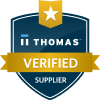Industrial brush material varies based on the application requirements. Some brushes may be customized with multiple materials to meet unique operational needs. The bulk of industrial brushes are made from some type of synthetic, metal, and/or natural hair. Examples include:
• Synthetics (polypropylene, nylon)
• Metals (bronze, brass, stainless steel, carbon steel)
• Natural hairs (horse hair, goat hair, boar’s bristle, tampico, bassine, palmyra)
Nylon and polypropylene brush fillings lend significant durability and cleaning ability to any brush. More natural options, like goat hair and boar bristle, tend to offer more variety. Boar’s bristle, for example, is the stiffest natural material available, while goat hair is known for its softness.
Some applications will benefit from the use of metal filaments. Brushes utilized in applications that benefit from corrosion-resistant and electrically conductive fill often rely on various bronze and brass alloys.
Common Uses of Industrial Brushes
Brushes play a central role in numerous industries. Industrial brushes from Cocker-Weber see use in a variety of industries, including (but not limited to):
• Automation
• Electronics
• Food processing
• Glass and ceramics
• Industrial machinery
• Lithography and printing
• Manufacturing
• Packaging and labeling
• Pipelines
Regardless of industry, brushes facilitate a multitude of tasks. Here are a few examples:
• A number of industrial applications use brushes to feed, guard, and sort products.
• Others polish and clean workpieces using standard or custom-created brushes.
• Bakery and food processing experts utilize brushes to help mitigate conveyor belt debris and separate ingredients.
• Dental hygienists use laboratory brushes to clean delicate equipment.
• The electronics industry relies on brushes to clean and/or polish specialized electronic components.
The potential uses for Cocker-Weber’s custom industrial brushes are virtually limitless.
At Cocker-Weber Brush Company, we understand how critical high-quality brushes can be within your unique applications. Many of our clients rely on us to ensure that their production and other work processes may continue as normal. Our industrial brush experience stretches back over a century—and we have the tools, capabilities, and knowledge that clients expect from a historical and reliable brand.










